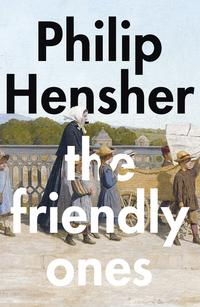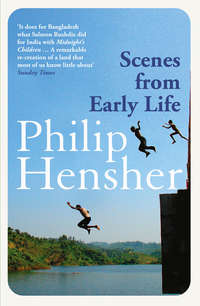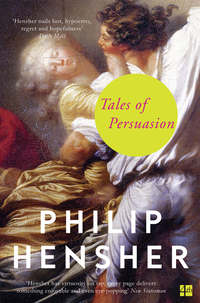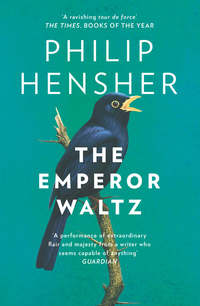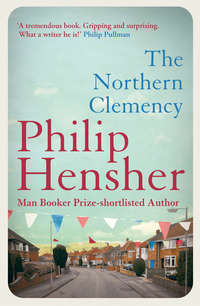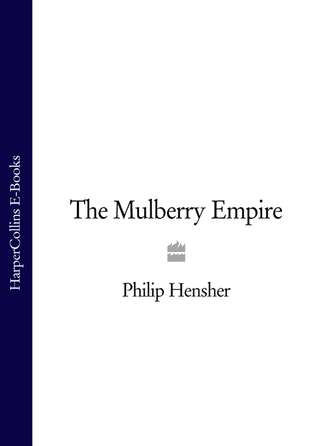
Полная версия
The Mulberry Empire
She felt able to plead fatigue, and John took them back to Hanover Square, their errands almost complete. Elizabeth, inexhaustible, let Bella off at Hanover Square before asking John to take her on, wanting to make her farewells to a friend in Green Street.
It was three in the afternoon, and Burnes had been waiting, ‘no more than five minutes, I assure you’.
‘How did you know I – we should return soon?’
Burnes smiled. ‘I did not. I had set a limit on my patient waiting.’
‘And how long was that, Burnes?’ Bella said, long ago having passed to this intimate, military form of address. She began to unpick her bonnet as they sat down. ‘I would like to know what value you place on my company, and the length of time you would wait for my return seems as accurate a measure as any. For some truly important person – let us say for the Governor General, the King, or my sister’s friend Goethe—’
‘I believe Herr Goethe is dead, Bella.’
‘No matter – for these, let us say they would merit a whole afternoon’s waiting, hat in hand, jumping to your feet every time the maid enters to feed the fire. On the other hand, let us say, for our friend Stokes—’
‘I was truly asking myself whom you were planning to alight on, but Mr Stokes is a very fair choice.’
‘Thank you. For Mr Stokes, I do not suppose you would wait at all; a mere drop of the card in the bowl, and off you would fly like an afrit riding the West Wind. Am I correct?’
‘Quite so.’
‘And yet you waited for me – how long I do not know – and you would, I believe, have waited a minute or two longer. How long the limit you had privately determined is for me to establish, and that, I presume, will inform me what value you place on the conversation of a silly little girl. I wonder with what ingenuity I can discover the true facts of the case.’
‘No ingenuity is required,’ Burnes said, laughing at Bella, scratching her head like a regular urchin. ‘I will tell you – I had decided to wait for fifteen minutes. In any case, I knew you had gone to your bookseller’s two hours before, since Emily was so kind as to tell me, and I knew a bookseller could not detain you much longer than that.’
‘Very well,’ Bella said. ‘Fifteen minutes. Now I call that a very valuable contribution to knowledge, though, like the higher mathematics, I hardly know as yet what use I shall put it to.’
‘I dread your uses, Bella,’ Burnes said, helping himself to tea and, greedily, to sugar. ‘But how long would you wait for me?’
Bella was silenced, and Burnes, too, in a moment stopped laughing. There was no answer to that; in them both was the unspoken knowledge that the ‘six weeks’, so lightly spoken, so long ago, had shrunk now to one week, that then, he was gone, that after, there was nothing that either could see. In Burnes’s pained anxious face was some knowledge that he had not been fair to Bella, and it would have been better not to have come at all; in Bella’s face was nothing but a forgiveness for anything Burnes might do, be doing, have done. Bella’s forgiveness had no tense, had no aspect, and Burnes dropped his eyes from hers, from her sad, her shining eyes.
‘In the interests of coquetry,’ Bella said, collecting herself, ‘no woman would ever wait for a man as long as he would wait for her. If I were a flirt, five minutes; if I were a woman of normal self-regard …’
But she saw in Burnes’s face that he had no heart any longer for their normal banter, that their conversation, like the afternoon, like their lives, had turned in an unexpected direction, and now there was no retrieving it.
‘Perhaps ten minutes?’ she said, and faltered, her eyes, now, big and swimming and full of ache. She looked at her lap.
‘Bella,’ Burnes said again. ‘How long would you wait for me?’
She could not think, and she hardly trusted her voice to speak.
‘I don’t know,’ she said simply. He could not look at her, perhaps in shame, and he drew back a little in his chair.
‘That,’ he said after a moment, ‘must be your brother.’
For a second she did not know what he meant, and then she saw he was talking about the portrait above the chimney breast. He was right to move away from these dangerous and unstable territories. There could be nothing much gained by talking each other into ultimately painful declarations. She rallied herself.
‘Yes, indeed, Harry, my poor brother,’ she said briskly. ‘Not a good likeness, but – forgive me, I was about to say something uncharitable.’
‘I should forgive you,’ Burnes said, smiling.
‘Very well, then; I was about to say that few people would have wanted a good likeness of Harry in a drawing room. He was so very – so very …’
‘Do go on, Bella,’ Burnes said. ‘I think I understand.’
‘No,’ Bella said. ‘He was so very much not at home in a drawing room. He was not quite – not quite tamed, I think one might say. He had a knack, a habit, of arriving anywhere early, and then progressing swiftly to the furthest wall. And then he would stand there – I mean, at a rout, if there was any promise of a crowd, of fresh blood and new flesh.’
‘You make him sound quite the vampyr,’ Burnes said, looking at the faintly extraordinary portrait with the perfectly round head, the legs crossed at the knees and the hand resting, extravagantly, on a tiger.
‘Perhaps so,’ Bella said seriously. ‘If you had seen him against the wall, watching as people came in, assessing himself, preparing himself to spring on his victim – and yet, of course, he could be excellent company and he was my brother. He had to go to India – there was a between-maid, and then another, and debts, cards, and then – you know, Burnes, I feel it shows very bad judgement to attempt to elope with the mother of your principal creditor.’
Burnes, despite himself, laughed. ‘Forgive me,’ he said. ‘But yes, not a highly judicious act. May I ask—’
‘Really, Burnes, she is still with us. You could hardly expect me to say Emma Franklin, could you? It was decided, then – Harry decided, and we decided, and London gave a great sigh of relief – that he should go to India and make his fortune. Not an unfamiliar story, you must admit, though Harry’s petits péchés were somewhat more ambitious than the common run. Packed off – dead within months. You heard of him, I recall, in Calcutta.’
‘Hardly,’ Burnes said. He had forgotten, by now, how he came first to speak to Bella; it was so very many weeks ago. ‘As I remember, I heard of him first in London – I heard that you had a brother who went to India and died. Only that.’
‘Ah,’ she said, taken by surprise, and all at once, he recalled his ordinary lie, and crimsoned gorgeously from the neck upwards. She was amused. ‘A very ordinary death; we heard that it was cholera, and cholera does, you know, carry off very many new arrivals in India. A year or so later, the portrait arrived, brought by some fellow Company officer – wallah, he called himself. They’d all put up a subscription and paid for the portrait to be finished. I heard the true story from him. Another very ordinary death – another officer’s wife behaved like an ass, and they were surprised. Did you know duelling was so much the fashion in Calcutta? Pew’aps it ain’t, as Harry would have said – Harry would have driven almost anyone to defend his honour with pistols.’
She had finished. He saw in her smile and anecdotal glitter how brave she was, and could be again. For herself, she saw only concern in a good man’s face.
‘You miss him, don’t you,’ he said finally. The room was dark, and quiet; she heard the heavy ticking of his watch in the empty house.
‘Yes,’ she said. ‘Yes, I do. Now, don’t betray me—’
‘I would never betray you, Bella,’ he said, and it was as if there were no other sentence in the world, there to be spoken. She shook her head, not able to look at him, and he understood very well that she meant Nor I you. He took her hand, and she moved, suddenly, her body moving in response to his touch like iron to a magnet. ‘Come with me,’ he said, rising and advancing to the door. He paused there, and turned, and smiled at her, and, deprived of all will, she rose herself, and followed him.
Out into the street they went, Bella entranced, without a wrap, without a bonnet, and they walked silently southwards through the London streets. No one saw them go; no one paid them any attention as they walked, and through London unfashionable and fashionable they went in silence. She followed him, and it was as if he were drawn by something; what it was, she could not guess, though she could feel that something was pulling him, and it was forty minutes before the streets opened and emptied and there they were, together, at the edge of the river.
Watching the river: watching a perfect chaos of boatmen unloading their goods and passengers onto the wharves. So much to be seen. They stood in bewitched amusement and watched as one lady, stout as a grub in a tight coat, between little shrieks of alarm, allowed herself to be handed into the safe arms of her brass-buttoned husband, waiting with flushed embarrassment on the wharf. Bella and Burnes were interested and uncaring as if the brass-buttoned gentleman had been awaiting a delivery of bales of cotton into his arms, and not merely a wife. By them stood the eager crowd of boys, some ragged, some Sunday-best, which always materializes from nowhere if there is ever the chance that a lady of respectable middle years may fall, shrieking, into a river. The two of them watched, attentively, and would not for the world have admitted that their motives were no more noble than those of the boys. The spectacle came to a disappointing end, safely, and the puerile onlookers almost sighed, waiting for the next entertainment the river’s ordinary traffic might afford them.
‘I would give ten pounds,’ Burnes said after a while, ‘to know the precise contents of every bale, every chest, every warehouse we can see.’ She had not expected him to say anything romantic, and he had not; he had said something better, something interesting. ‘To come down here – I feel rather like a novelist must in a crowded room in an inn. To feel that if all the unspeaking secrets contained in it were opened up – then, I should be master of the world, and know everything.’
‘What would you discover?’
Burnes picked up a stone and sent it skimming into the river.
‘Nothing, perhaps,’ he said. ‘You could ask people about their passions. That is the way to discover something. No – they would only lie to you.’
‘Sometimes,’ Bella said. ‘Would we discover a great deal by your exercise? Even if we did go down to the wharf and pay the boatman five shillings to allow us to inspect his load, what do you suppose we should find? A boatload of cotton, or coal, or tea, I expect; nothing more interesting or romantic than that.’
‘Bella, you disappoint me,’ Burnes said, rubbing his hands together, although it was not cold in the slightest degree. Bella turned and stared at her companion, as if he had gone mad. ‘Not interesting? Not romantic? The docks of London?’
‘Romantic?’ Bella said. ‘Come now, Burnes, be less paradoxical with me. I am too dull for this.’
‘No paradox whatever,’ Burnes said. ‘Merely think – cotton, and coal, and tea – commonplace dull things. Think where they have come from, Bella; think of the journey they have undertaken, through what wastes and deserts, think what hands they have passed through, what fortunes, what hopes rest on these ordinary things. There are men thousands of miles beyond India, whose inner eyes are bent, this very moment, on that exact load of rice, there—’
‘You exaggerate, sir.’
‘Not a whit. Men considering whether, now, their little fortune has reached England safely or is at this moment lying at the bottom of the sea; men wondering whether some shift in weather will double the value of what they sent us, so many months ago, when it comes to sale, or whether it will realize half the poor farmer’s expectations. Riches or poverty, competing furiously in a man’s mind; a family made or destroyed, there in that bale. Look on that, Bella. Look in front of you. The whole world is here, this afternoon, now. In those cases, being thrown down, coffee and silks and spices, wool and diamonds, all docketed and ticked, all as if it were the most ordinary thing imaginable that the great world should pass through London, like a great haystack passing through the eye of a single needle. Import and export; sending England out to the world, taking the world into England. Cotton, silk, spice, coffee, gold, silver. The world, Bella, the world. Do you not feel it, Bella? Do you not see that I am showing you what I can, showing you the world? You could never find out what people want by going into a room and asking them. But by God, if you could stop this day now, at this moment, and spend as long as you liked examining every bale, every load, every sack of goods you can see, finding out what everything was worth, who sent it, who is about to buy it, by God, you would begin to understand the world. You would begin to understand what the world dreams of.’
9.
The river continued its placid brown life, unmoved by Burnes’s enthusiasm. As Burnes had talked, they had started to walk again, and they now found themselves in the shadow of the great bridge. A boatman clung on to the rope hanging on the nearest pier, the boat under his lurching feet being pushed away by the current. It swung from one side of the great pier to the other. With his left hand, he nonchalantly ate a bit of bread and an onion. The river was low, its stench so strong and heavy that it could be tasted in the mouth. A flock of coal-lighters was secured for the next few hours in the treacle-rich ooze of the river’s mud, a stuff almost valuable in itself. On the far bank, boys, almost naked, were plunging into this thick mass of mud, occasionally surfacing with cries to show that some small treasure, some penny had been found. Here surfaced a boy, black and dripping, his hand upstretched with a treasure, and trying to hail a little green tug with his shrieking gull-cry. The traffic of the river continued its furious pace uninterrupted, in the middle stream, like water-insects, handling each other out of the path with busy prodding prongs, hooks, ropes, businesslike and abrupt, not pausing for pleasantry, or apology; the purposeful dancing of a rude public ball. Long and intricate levels of wooden stairs and causeways, eroded and slippery smooth, clung to the river’s edge, and each boat, loading, unloading, mooring for a few short hours, seemed like an efficient drab bird which had alighted on one branch rather than another for no particular reason. In a moment it would set off again in a new direction, impelled by nothing more than its own furious energy. As each boat sat there, it seemed as if it cost it more energy to stay still than to move.
Bella said nothing. To her, it had always seemed the river, brown-black, crowded, noisy and stinking; it had never seemed to matter greatly where her tea came from, what produced the stuff for her linen. She could not suppose that the originators of the stuff worked explicitly to supply her with tribute, like the worshippers of a pagan god. Money and trade; filth and lucre. And yet she did feel it, she did; she felt that here, with Burnes, she was being shown a world; whether it was the great world Burnes descanted on, or the great opening mind of a man she suddenly, incomprehensibly, loved and would give herself to, she did not know.
‘It frightens you, the world?’ Burnes said suddenly. His eyes were fixed on Bella’s face; they were dark and swarming with appraisal. They wavered in their orbs as if searching for some secret that Bella’s face held.
‘Perhaps it does,’ Bella said carefully. ‘Sometimes I don’t understand what – quite what the greater part of it has to do with me. You will despise me for that.’
‘Never,’ Burnes said, his eyes fiery, fixed on hers, and in one unspoken agreement, they turned, and began to pick their way through London, to return to the place they came from.
The house, still, was empty as they entered, and in the dark hall, Burnes turned to her. She looked with bewilderment upon his face, but he was not preparing to leave her: on the contrary, he was keeping her, and in his expression was a new certainty, as if he knew all at once where to go and what to do. Still with her hand in his, she, all bewildered, submitted to be led forward a pace or two. He hesitated for a moment: it appeared that now he had forgotten what opportunity he had perceived in the course of the journey from the river to this sad empty house; forgotten why he was standing here, why he had taken Bella’s hand. But it was, after all, easier than that. She looked at him. His head was cocked like a foxhound’s. He was listening for the sound of any other person in the house.
‘Very well, then, Burnes,’ she said, and she had spoken her decision, her right hand in his. What they had understood with the burden of those so few days bearing down upon them, neither would express: she felt that. He led her, then, saying nothing, and she submitted to be led; and together, in the empty house, they walked upstairs.
FIVE
1.
ASTRANGER WAS THERE, out there, somewhere, somewhere in the haphazard piled-up overlapping streets of Kabul. No one had planned this city, and its many streets were like hundreds of thousands of individual routes. As if a pond was made of the ways that fish find through it. Down there, somewhere in the carpet-mass of pattern and direction and half-intended result, a European stranger had arrived, in an inadequate and fascinating disguise, and the town, quietly, was talking and talking and talking about the new arrival until the muted babble of discussion mounted the hill to the austere halls of the Bala Hissar, and reached – so quickly, so quickly – the ears of the Amir. And to the Amir, the arrival of the new European in town was like the dropping of a rock into the opaque pool of water which was the city, ruffling the surface immediately in ordinary and predictable ways, but disturbing the substance and mass beneath in a manner which could not be seen, or predicted. The Amir sat on the steps of the throne room, with the nobles and the clergy, and listened, noncommittally nodding his head from time to time, as if he were hearing nothing more than gossip.
‘His hair is red,’ the Newab Mohammed Zemaun Khan said. ‘Red, red as the devil’s is.’
‘And he wears the clothes of the country people,’ the Newab Jubbur Khan cut in. ‘He came from the East, from India, but he has been to many, many places. He speaks to everyone about the places he has been, and asks everyone, down to the smallest child, a thousand thousand questions.’
‘A wise man, then,’ the Amir said, pretending to reprimand the court. The Newab Jubbur Khan was a poor fellow, the Amir’s brother, and if Mohammed Zemaun would one day amount to something, for the moment he was no more than the Amir’s gawping boy-nephew.
‘A spy, Pearl of the Age,’ a mullah said. The Amir Dost Mohammed Khan turned, not recognizing the voice; it was the Mir Wa’iz, the teacher of Kabul, speaking through a mouthful of food.
‘A spy, Holiness?’ the Amir said; the Mir Wa’iz had not, quite, recovered from his display of asininity, weeks and weeks before. He had, after all, allowed the English to question holy doctrine over the question of the faithful Esquimaux, and could still be savagely teased on any subject. ‘But what enemies can I see on the most distant horizon? Do we not live in peace and plenty?’
‘A fool, then,’ Mohammed Zemaun said. ‘Or a mere scholar.’
‘He came from the East,’ the Mir Wa’iz insisted, in his best holy inscrutable manner.
‘A scholar, I expect,’ the Amir said. ‘But we shall spy on him, a little, shall we not?’
In truth, Dost Mohammed felt and knew that the arrival of the new Englishman was, in the end, going to prove to be more than gossip, but for the moment there was no reason for the clergy and nobles and wives to know such a thing, and his nodding head was intended to soothe the city into a mood of mere curiosity about the interloper …
… and down there, in the city, in a hired house, the Amir could almost see the interloper in his absurd and extravagant disguise, writing like a poor scribe, his head down to the page, his tongue almost out. When the Amir concentrated, he could see the arrival, beginning to write, concentrating, his mind on what he was doing, his sudden and uncontrolled movements betraying the angry impatient European fool as he put one word after another down. Like all Europeans, he would be writing about himself, setting down the ease and mastery with which he had come to this point, and the ease and mastery with which he had persuaded the city of what he was. His name the Amir did not need to imagine. He knew it: Masson. And down there in the city, in the far-off distant serene concentrating gaze of the Amir, Masson, the new arrival in his inadequate disguise, started to write …
The nobles and the clergy stirred among themselves, restlessly. They were dressed splendidly, and in their thick brocades they seemed to whisper, although nobody spoke. Against them, the Amir looked like an angel, come down from heaven to reprimand them. Today, as every day, he was resplendent in his white muslin; a six-foot angel with a broad curving nose and bad teeth.
‘The Sikhs,’ he said finally. It was the end of a train of thought which had begun with the interloper, Masson, and ended with a British-funded invasion of the Amir’s empire. The angel, bad-toothed, imperial in white, looked into the middle distance of the throne room, and saw the far locked doors being flung open by British soldiers, each a fat little red-faced replica of Burnes, armed to the teeth; beyond it, the Amir’s empire, so carefully subdued and brought together, like a basket weaved of Jew’s-hair thread, was being trampled through by an endless line of similar red-faced replicas, backed up by the filthy stupid – the Amir pursued his own indomitable line of thought, and came to a single sounding conclusion. ‘The Sikhs,’ he said.
‘The Sikhs, Pearl of the Age?’ the Newab Mohammed Zemaun Khan said. None of the heavy crowd of nobles understood what the Amir meant; a moment ago, he had seemed to be talking, or to be about to talk, about the Englishman, and to have dismissed the idea that he could be a spy. And now he had moved on to the Sikhs, the thorn in the side.
‘I am talking about the Sikhs,’ the Amir said, calmly. ‘Did they send the English spy? What is he here to find out? Who sent him, if not the English? Why, may I ask, do you come here laden with gossip to weary the ears of women, and have no knowledge, no conclusion, nothing, nothing, nothing, of interest for your Emperor?’
Just at that moment, a hammer struck on metal, somewhere, three rooms away, and the court, with thanks, admitted silently that it had nothing to say about the Sikhs. In a moment, more food came in, borne at shoulder height; it was ceremonial food, and everyone gratefully arranged themselves around it. No one was hungry; everybody ate. It was easiest.
2.
‘We need to know about the English,’ Dost Mohammed said.
The English? It was an unspoken question around the court. These abrupt changes of subject were familiar in the inner chambers of the Bala Hissar; the court took them as they took the vapid maxims of the mullahs. They demonstrated the workings of a profound mind. When a mullah emerged from deep thought to pronounce that Life is a dream, and therefore, a dream is life, he commanded a general flaccid assent. No one would contradict him, not knowing what thoughts had led to a conclusion so perfectly meaningless. Talking to the Amir was rather like that, except that the workings of his mind usually emerged in the end. His brief peremptory comments could be difficult to link, since they were only fragments of a brilliant, involved, silent analysis of a large subject. But the court fell silent when he made these remarks, and observed the Amir, eyes lowered, in respect.


